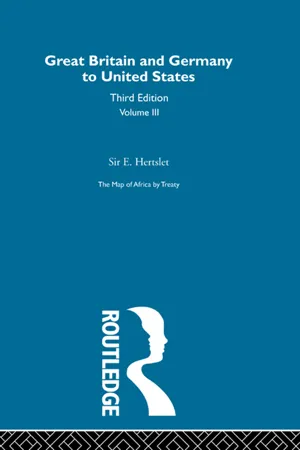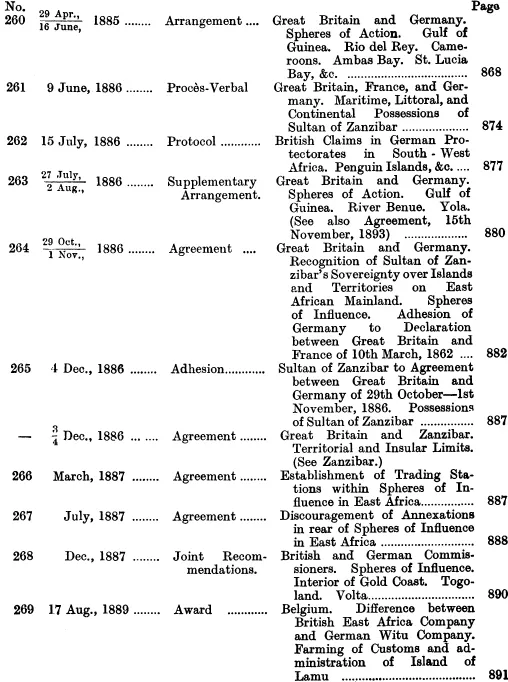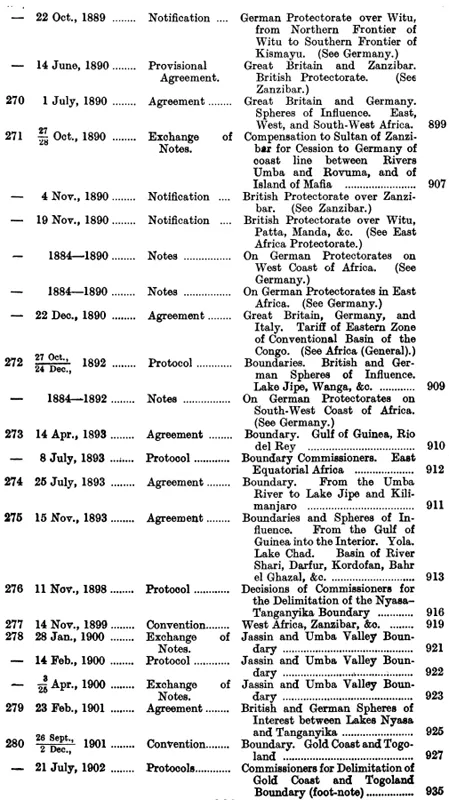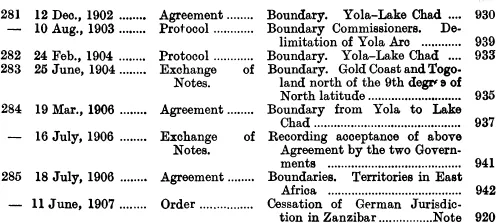
- 1,404 pages
- English
- ePUB (mobile friendly)
- Available on iOS & Android
eBook - ePub
The Map of Africa by Treaty
About this book
First published in 1895, this is a guide to the stages and bargains by which the present African frontiers have been created.
Frequently asked questions
Yes, you can cancel anytime from the Subscription tab in your account settings on the Perlego website. Your subscription will stay active until the end of your current billing period. Learn how to cancel your subscription.
No, books cannot be downloaded as external files, such as PDFs, for use outside of Perlego. However, you can download books within the Perlego app for offline reading on mobile or tablet. Learn more here.
Perlego offers two plans: Essential and Complete
- Essential is ideal for learners and professionals who enjoy exploring a wide range of subjects. Access the Essential Library with 800,000+ trusted titles and best-sellers across business, personal growth, and the humanities. Includes unlimited reading time and Standard Read Aloud voice.
- Complete: Perfect for advanced learners and researchers needing full, unrestricted access. Unlock 1.4M+ books across hundreds of subjects, including academic and specialized titles. The Complete Plan also includes advanced features like Premium Read Aloud and Research Assistant.
We are an online textbook subscription service, where you can get access to an entire online library for less than the price of a single book per month. With over 1 million books across 1000+ topics, we’ve got you covered! Learn more here.
Look out for the read-aloud symbol on your next book to see if you can listen to it. The read-aloud tool reads text aloud for you, highlighting the text as it is being read. You can pause it, speed it up and slow it down. Learn more here.
Yes! You can use the Perlego app on both iOS or Android devices to read anytime, anywhere — even offline. Perfect for commutes or when you’re on the go.
Please note we cannot support devices running on iOS 13 and Android 7 or earlier. Learn more about using the app.
Please note we cannot support devices running on iOS 13 and Android 7 or earlier. Learn more about using the app.
Yes, you can access The Map of Africa by Treaty by Sir E. Hertslet in PDF and/or ePUB format, as well as other popular books in History & World History. We have over one million books available in our catalogue for you to explore.
Information
THE
MAP OF AFRICA BY TREATY.
PART II.
GREAT BRITAIN AND GERMANY
TO
UNITED STATES.

APPENDIX.
Great Britain and Germany.1

List of Treaties, &c.




No. 260.—ARRANGEMENT between Great Britain and Germany, relative to their respective Spheres of Action in portions of Africa. 29th April—16th June, 1885.2
(1.) Earl Granville to Count Münster.
| M. l’Ambassadeur, | Foreign Office, 29th April, 1885. |
In my note of the 19th ultimo, I had the honour to forward to your Excellency the draft of a Memorandum of Agreement for separating and defining the spheres of action of Great Britain and Germany in those parts of Africa where the Colonial interests of the two countries might conflict.3 In the subsequent negotiations it has been notified that the German Government accept the proposed Agreement with certain modifications. I am consequently now in a position to state that Her Majesty’s Government are prepared, on receiving the assent of the German Government, formally to adhere to the following Arrangement.
Gulf of Guinea and Interior Districts.
Great Britain engages not to make acquisitions of territory, accept Protectorates, or interfere with the extension of German influences in that part of the coast of the Gulf of Guinea, or in the interior districts to the east of the following line : that is, on the coast, the right river bank of the Rio del Rey entering the sea between 8° 42’ and 8° 46’ longitude east of Greenwich ; in the interior a line following the right river bank of the Rio del Rey from the said mouth to its source, thence striking direct to the left river bank of the Old Calabar or Cross River, and terminating after crossing that river at the point about 9° 8’ of longitude east of Greenwich, marked “Rapids” on the English Admiralty Chart.
Germany engages not to make acquisitions, accept Protectorates, or interfere with the extension of British influence in the coast of the Gulf of Guinea lying between the right river bank of the mouth of the Rio del Rey, as above described, and the British Colony of Lagos ; nor in the interior to the west of the line traced in the preceding paragraph.
Victoria, Ambas Bay, to Remain a British Possession.
Both Powers agree to withdraw any Protectorates already established within the limits thus assigned to the other, a reservation being specially made as to the settlement of Victoria, Ambas Bay, which will continue to be a British Possession.4
East Coast. British Flag at Santa Lucia Bay.
Germany engages to withdraw her protest against the hoisting of the British flag at Santa Lucia Bay.5
Coast between Natal and Delagoa Bay.
And to refrain from making acquisitions of territory or establishing Protectorates on the coast between the Colony of Natal and Delagoa Bay.
I shall be glad to receive from your Excellency a formal notification that the German Government accept the arrangement above recorded.
I have, &c.,
Granville.

(2.) Earl Granville to Count Münster.
Victoria, Ambas Bay.
| M. l’Ambassadeur, | Foreign Office, 29th April, 1885. |
YOUR Excellency is aware that, in the Agreement for defining the limits of the territorial jurisdiction of Great Britain and Germany on the West Coast of Africa in the neighbourhood of the Cameroons,6 which I proposed to Count Herbert Bismarck, and of which I am today requesting the formal acceptance by the German Government, I made an express exception as regards Ambas Bay, on account of the rights there of a settlement of Baptist missionaries whom Her Majesty’s Government could not undertake to transfer against their will to German jurisdiction.
I stated, however, at the time, and I have the authority of the Secretary of State for the Colonies to repeat, that if the German Government should be able themselves to come to a satisfactory arrangement with the missionaries, there being no political necessity involved, the difficulty as to the cession of Ambas Bay would disappear, and Her Majesty’s Government would be ready to agree to its being included in the territories to be placed, in accordance with the arrangement, under German protection.7
I have, &c.,
Granville.
(3.) Count Münster to Earl Granville.
(Translation.)
| My Lord, | German Embassy, London, 7th May, 1885. |
I HAVE had the honour to receive your note of the 29th ultimo on the subject of the negotiations between the Imperial Government and Her Majesty’s Government with regard to a separation and definition
(4.) Count Münster to Earl Granville.
Victoria, Ambas Bay.
(Translation.)
| My Lord, | German Embassy, London, 7th May, 1885. |
IN your note of the 29th ultimo on the subject of the definition of the spheres of British influence of Germany and England in the Gulf of Guinea, it is stated that the Settlement of Victoria, Ambas Bay, remains for the present a British possession.
By your note of the same day with reference to the negotiations which have taken place relative to the cession of Ambas Bay, your Excellency has, however, in conjunction with the Secretary of State for the Colonies, repeated the assurance given to Count Bismarck, that the cession of Ambas Bay presents no political difficulties, and that the English Government would agree to it as soon as the German Government could come to an understanding with the English Mission Society.8
In acknowledging the receipt of this communication, and taking note of the understanding of the two Governments with regard to its contents, I take the opportunity of, &c.
Münster.

(5.) Earl Granville to Count Münster.
Commercial Relations.
| M. l’Ambassadeur, | Foreign Office, l6th May, 1885. |
DR. KRAUEL, in his recent interviews respecting the arrangement now concluded regarding the Protectorates of Great Britain and Germany on the African coast, stated that it is the wish of the German Government that the settlement of the boundary between the British and German Protectorates on the Gulf of Guinea should be followed by negotiations for a commercial arrangement insuring equality of treatment for the trade of the two countries in the respective Protectorates.
It was pointed out that while Her Majesty’s Government fully accepted the principle of equality of treatment, it was premature to negotiate the adoption of formal engagements as the question of the administration of the Protectorates must first be settled. Dr. Krauel urged that at any rate such assurances might be exchanged as might satisfy traders that there would be no differential treatment, and that no excessive duties would be imposed. These assurances Her Majesty’s Government have no difficulty in giving, and I have consequently to request your Excellency to convey to the German Government the following expression of their views and intentions :—
Her Majesty’s Government cannot at present make any definite declaration as to the limit of duties to be imposed, but they are prepared to give the assurance that those duties will be levied solely for the purpose of meeting the expenses necessary to enable them to carry out the obligations imposed upon them by the Protectorates, and that they will be as moderate as possible.
They are prepared to give every assurance that there shall be no differential treatment of foreigners or foreign goods.
They will be fully prepared to apply to the British Protectorates the provisions of the second paragraph of the Vth Article of the Act of Berlin (No. 128), which secures protection to the persons and property of foreigners, and to engage that there shall be no differential treatment of foreigners as to settlement or access to the markets, it being understood that the regulation of these questions must be subject to administrative dispositions in the interests of commerce and of order.
They are ready to undertake that no less than four months’9 notice shall be given by the local authorities of the adoption of any alteration in the Tariff of duties.
I have to request your Excellency to explain that these assurances are given subject only to the receipt of a reciprocal undertaking from the German Government as regards the Germa...
Table of contents
- Cover
- Half Title
- Title Page
- Copyright
- Vol. III. Part II., Nos. 260 to 373. Great Britain and Germany to United States